| Caligula: "But they love you, oh lord." |
| Tiberius: "Oh no, they fear me, and that is much better." |
The word 'notorious' tends to be somewhat liberally applied to works of art and entertainment that are looking to bust a barrier or two, or to simply get themselves noticed, but in the case of the 1980 film Caligula it fits like a perfectly tailored toga. Written by respected author Gore Vidal, the considerable funding needed to realise his vision was secured from none other than Bob Guccione, the head honcho of the Penthouse empire. For those of you too young to remember, Penthouse was what used to be politely referred to as a 'men's magazine', publications whose raison d'être were glossily shot photos of naked girls for a pre-internet male audience to toss off to, which were surrounded by articles on fast cars, boats, entertainment, high living and the like. In an increasingly crowded market, Penthouse was one of the most successful of its kind, making Guccione a multi-millionaire at a time when such figures weren't quite as common as they appear to be now.
A number of renowned filmmakers were considered and even approached to direct the movie, including Lena Wertmuller, Federico Fellini and, rumour has it, post-Don't Look Now Nicholas Roeg. But Guccione and the film's co-producer Franco Rossellini both managed to catch Salon Kitty, another film that wears the badge of notorious with ease, and decided that the man who had made it was the boy for them, and Italian director Tinto Brass was hired. Of course, Brass came with his own ideas about the story structure and the casting of the main characters, something Gore Vidal's name on the script and Guccione's deep pockets had little trouble attracting. Malcolm McDowell, a hot property after If...., A Clockwork Orange and O Lucky Man!, was secured to play Caligula, Peter O'Toole signed on as Tiberius, John Gielgud was cast as his close advisor Nerva, and respected Shakespearian actress and rising movie star Helen Mirren came on board as Caligula's wife Caesonia. Brass and Vidal appear to have initially been unified in their intentions, that this would be an unflinching film about the more depraved and corrupt aspects of Roman society, one that would show what really went on behind Imperial walls, and at the same time slyly comment on the decadence of modern western society. This meant including scenes and imagery that no mainstream film had even toyed with before and embracing controversy as an essential aspect of the production and eventual release.
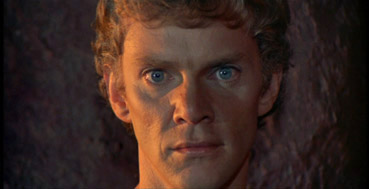
The problems didn't really start until shooting was under way. Brass and O'Toole didn't exactly hit it off, but the first sign of troubles to come became evident when Vidal fell out with both Brass and Guccione and found himself effectively banned from the production. Oscar-winning production designer and Fellini regular Danilo Donati was given a free hand and ran with it, constructing huge and elaborate sets that sent the budget soaring. Guccione became increasingly unhappy when he realised that the money he was investing was not producing the sexy movie he was hoping for, but a film in which sex was being portrayed as dark and depraved and not remotely arousing. He was particularly narked that Brass was using local Italian girls instead of Guccione's idea of what constituted beautiful women. This, for me, is the first sign that he was just a bit delusional. I mean, have you been to Italy? Come on! Guccione's solution was to fly in some Penthouse Pets – American models fresh from posing nude in his magazine and seduced by the idea of a movie career – and impose them on the director.
With the relationship between Guccione and Brass now in serious decline, Guccione decided that the perfect way to spice up the movie was to secretly go into the studio at night and shoot additional hardcore material on the same sets that Brass had been working on by day, then smuggle the footage to London without the director's knowledge. When shooting was complete, Brass was locked out of the editing room and the film was edited by Guccione himself, a man with no training or experience of the task. I'm assuming that he had at least some help here – the editing is credited to 'The Production' – but Guccione made sure that his hardcore material featured in almost every scene, whether it belonged there or not. Brass saw his director credit demoted to that of Director of Principal Photography, Vidal demanded his name be removed from the film, and the lawsuits began to fly. The film got its expected X rating in the USA, which meant it could only be shown in porn theatres and could not be advertised in the national press, a barrier Guccione vaulted over by buying a number of cinemas specifically to screen the film in. Reviews were almost universally damning and most of the lead actors publicly distanced themselves from the version Guccione had surreptitiously created.
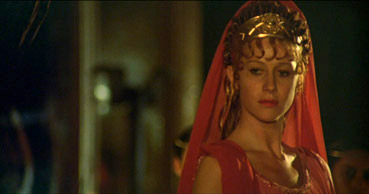
Faced with potentially massive losses, Guccione agreed to a re-edit in which the stronger material was replaced with alternative footage, resulting in an R-rated cut that could play at regular cinemas, at least in the US. This did nothing to improve the film's critical standing and to admit to actually liking any version was to invite theatrical snorts of contempt from dedicated cineastes. Did I care? Not one hoot. I saw the censored UK cut on its release with a good friend of mine – two film enthusiasts with a fondness for all things Ancient Roman – at an afternoon screening in Romford and we had a ball. We emerged from the cinema in a fine mood doing dodgy immitations of Caligula's extended arm dance (you'll know it when you see it), confusing the hell out of those in the queue for the next performance.
A good many years have passed since then, and despite the afternoon of fun that the film provided I've never revisited it, at least until now. That's 28 years and a lot of taste-changing movies later, during which time I've been intermittently reminded by others how terrible the film is, and by implication how misguided I was to think I'd enjoyed it. It's certainly a bugger of a review to take on, as this 4-disc set contains the three most commonly seen cuts of the film (including, for the first time in the UK, the X-rated version), three commentaries and a lorry-load of other extras. I'll openly admit that I have neither the time nor the dedication to produce a shot-by-shot listing of the differences between the cuts, and if that's what you're looking for then either consult the Alternative Versions section of the film's IMDb page (link here) or buy this DVD set for yourself. I'll save you some reading time by assuring you that the extra features just about justify the purchase alone and this really is as close to a definitive release as you're likely to see. The key question is whether I still found the film as entertaining as I did back in 1980, or whether I was going to shiver at the thought I ever claimed to have liked then film. I feared the latter, but hey, the world is full of surprises...
If you've already seen Caligula and made up your mind that it's trash then I seriously doubt anything I say will change your mind, but I reserve the right to disagree and justify my decision. I can't see that anyone is going to claim this is a misunderstood masterpiece, but there's a lot more going on here than tits, tyranny and togas, and some of what makes the film worthwhile remains unique to this particular vision of Ancient Rome.
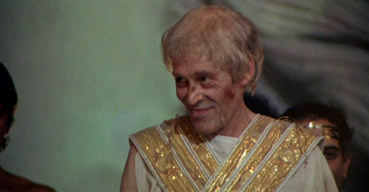
I'm assuming that most of you know who Caligula was (adopted grandson of Emperor Tiberius and Emperor of Rome between AD37 and AD41) and that he is generally regarded as a certifiable nutball. You may well have read Suetonius's The Twelve Caesars or Robert Graves' wonderful I, Claudius and Claudius the God. You may have even studied ancient Roman history and its sometimes corrupt and unstable leaders. For many, though, their first contact with Caligula will have been through the BBC's TV adaptation of Graves' novels, in which he was played to insane perfection by John Hurt.
A common misconception about Caligula the movie is that it was little more than a cheesy attempt to cash in on interest in the more salacious aspects of Roman Imperial family, following the critical acclaim and audience enthusiasm for the BBC's production of I, Claudius. This is not true. Although it did not go on general release until 1980, four years after I, Claudius was first screened, the shooting of both productions took place almost simultaneously – Vidal's influences were literary, not televisual. Of course, the acclaim and prestige that still surrounds the BBC production also serves to cast Caligula as the overdressed bastard nephew of a respected and admired first son, and in case you think I'm building up to a spot of I, Claudius bashing then know this – I, Claudius is my absolute favourite television drama and one of only a handful I could watch endlessly without ever tiring of it. As drama, Caligula really doesn't come close, but I refuse to play the popular game of completely dismissing a film work simply because there's another on the same subject that is widely recognised as superior. Caligula approaches the story covered in three key episodes in I, Claudius from a very different perspective to its BBC cousin, directly confronting elements of the story that Claudius only alluded to or shied away from. And if the budget allows for a more flamboyant view of Rome than a 1970s BBC TV series could ever achieve, then its sexual frankness also makes it feel closer to what you can't help thinking Ancient Rome at its most depraved was actually like.
This is most keenly felt in the early scenes in Capri in the company of Tiberius, who in his last months of rule embarked on an amoral hedonistic binge of epic proportions. While in I, Claudius, Tiberius in decline was presented as paranoid, tormented and lecherous, the nature of his multiple perversions were left largely for us to imagine. In Caligula, Tiberius is a morally bankrupt and physically unpleasant creation (on first meeting O'Toole in his makeup, Helen Mirren had to excuse herself to nip outside and vomit), an old man riddled with syphilitic sores and whose state of physical decrepitude contrasts starkly with the bodily beauty of the nymphets he swims with and fondles, and the menagerie of sexual playmates of both genders whose only purpose is to perform whatever depraved acts their Emperor desires. This orgy of perversity, coupled with Donati's dark, gargantuan sets, create an almost Dante-esque vision in which the Roman world is presented as one of the seven layers of hell.
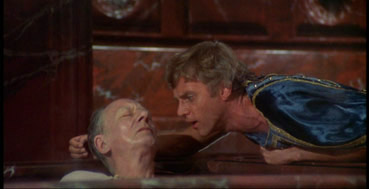
Somewhat surprisingly (but then again perhaps not considering the original screenwriter), the characters and events are largely true to history, or at least what we know of it through the writings of Suetonius and Cassius Dio. The Emperor Tiberius has been corrupted by power and wanton hedonism and is indulging his every whim at his palace in Capri. When Caligula, who is carrying on an incestuous relationship with his sister Drusilla, is summoned to the palace, he fears the worst. But he manages to repeatedly sidestep trouble and take advantage of his close proximity to the Emperor, seizing power by pulling the Imperial seal from Tiberius's finger just moments after his death and proclaiming himself the new ruler. Except Tiberius is not quite dead. Fortunately for Caligula, Macro, the head of the Praetorian Guard and loyal to the young prince, is on hand to put that right. Of course, loyalty to Caligula provides no long term guarantees, as Macro soon finds out to his cost. Once Emperor, Caligula continues to sleep with Drusilla, but for the sake of public appearances agrees to take a wife, quickly settling on fiery prostitute Caesonia. The new Emperor's behaviour becomes increasingly erratic as he follows Tiberius's lead in the pursuit of the extreme, making his horse Incitatus a consul and bankrupting Imperial coffers through his spending on the many games and festivals he stages to buy popularity with the Roman people.
Although traditionally seen and portrayed as an amoral madman, McDowell's Caligula comes across more as a child trapped in the body of an adult, lacking moral judgement and empathy for his fellow citizens and even the common sense that a man in his position would normally be expected to have in abundance. Given access to ultimate power, he behaves exactly as a child would in his position. Like young Anthony Fremont in the memorable Twilight Zone episode It's a Good Life, whose ability to transform or destroy anything or anyone that displeases him triggers complete obedience and a desperate need to please in those around him, his actions are unrestrained by maturity or moral judgement and thus ensure complete and terrified compliance from everyone he encounters.
Of course, by focussing on the sleazier aspects of Caligula's reign, the film inevitably feels anaemic in other areas. Claudius in particular becomes mere background decoration, a camp Christopher Biggins lookalike who hovers at the edge of scenes looking nervous and stupid, a man you can't imagine ever taking a real senatorial decision. The build-up to Caligula's eventual assassination is also a light on detail, the Emperor's repeated mocking of Praetorian guard leader Cassius Chaerea reduced to a few minor taunts, the plot to remove him to brief words exchanged between Chaerea and senate bigwig Longinus (played by a splendidly oily John Steiner).
Transfer issues aside (I'll get to that), the film looks intermittently ravishing, the result of Danoti's opulent production design and Silvano Ippoliti's lighting camerawork, both of which tend to favour the unusual and exotic over the realistic. This occasionally drags the film into the realms of surreal fantasy, as with the giant killing machine used to behead the unfaithful – an eye-catching sequence in itself, it's one of several scenes that intermittently make the film feel like the result of an argumentative collaboration between Federico Fellini, Ken Russell and a stoned Derek Jarman. The filmmaking itself, though competent enough, does not always live up to the imagery. Brass's technique of shooting scenes with three side-by-side cameras – one on wide and the other two selecting appropriate mid-shots and close-ups – may work well for continuity and keep the actors on their toes, but sometimes robs sequences of traditional reverse angles and renders them cinematically a little flat, restricting our viewpoint to that of a theatre audience armed with opera glasses.
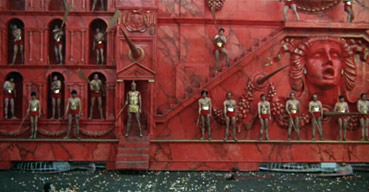
As for the three versions, while it's great to finally be able to see the uncut print after all these years (although having not seen it before I can't swear that it really is intact), the additional material does often play exactly like what it is, add-ins that rarely flow with the narrative or look part of it, like a comical YouTube re-edit in which name actors gawk at imagery they were never told they were seeing or were intended to be cut with. This is especially true of the climactic ship orgy scene, as while this is one sequence where Guccione's porn would seem wholly appropriate, the seemingly endless cutaways to the same lingering blow job is as tiresome and unerotic as it is dramatically redundant (apparently the orgy sequence went on for far, far longer in Guccione's original four-hour cut, where its deadening effect sent even his supporters to sleep). The tricky thing in some scenes, especially if you come to this version first (no pun intended), is working out exactly where the dividing line between Brass and Guccione lies – Brass had been determined to push some boundaries on nudity and the nature of the sexual acts, and some of the more extreme elements are thus still down to him.
But for all its excesses, there's still much to enjoy and even admire here, in the performances of the leads, in the look and feel of a Rome slipping into madness, in the handling of specific sequences, in the moments of twisted comedy (the illness stricken Caligula sharing his bed with Incitatus and asking his attendees to "take my horse to its own bed" is borderline Monty Python) and even in some of the sexual elements – the threesome involving Caligula, his wife Caesonia and his sister Drusilla is surprisingly tender and dramatically sound, at least it would be is it had not been clumsily intercut with two Penthouse pets going down on each other in an ajoining room. I'm not going to claim that Caligula is a great movie, because it definitely ain't – I'm not even sure it's a good one, at least not in it's pornographically reconstituted form. But it is still an intermittently fascinating work whose many fine moments – which include the frenzied spearing of Caligula's body after his assassination and the almost mythic final appearance of Incitatus – provide a window in the strange and possibly far better movie that might have been.
Ah... Well, whatever your view on Caligula's content, there was one thing we all remembered from that first cinema viewing, and that was that it looked great. Notice that use of the past tense. All three transfers here are of variable quality. At their best – usually when the image is bright – the picture is pretty good, with the clear colours and a reasonable degree of sharpness, but elsewhere it's a lot less easy on the eyes, with the intermittently flickery areas of single colour, fuzzy detail and dingy look of some darker scenes making this big budget film look at times like a cash-in cheapie shot on someone else's sets. Adding to the problem is that the entire package appears to have been ported over from the Analysis Film Releasing US release, a process that has seen all three cuts of the film and all of the extras undergo a so-so NTSC to PAL conversion. Upscaling to a large HD TV makes matters worse, exaggerating the problems and adding its own very visible compression artefacts. This is, it has to be said, a major flaw in an otherwise excellent 4-disc set, one that could well be the deciding factor for many on whether they fork out for it now or hang on until the price drops. The picture is framed 1.92:1 (that's not a typo) and anamorphically enhanced.
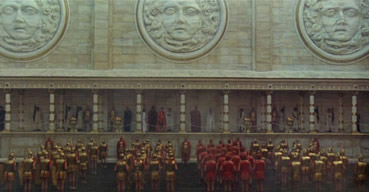
There's a choice of soundtracks between Dolby 2.0 stereo and Dolby 5.1 surround, but to be honest there's not a lot of difference between them, although the music does have a little more poke on the 5.1.
The extra features – and there are a lot of them, are spread across two of the three film discs and the extras disc.
The Alternative Version
Deleted & Alternate Scenes (48:08)
Exactly what it says, but with a too-generous spattering of naked romping and even some rude games with animals. There's plenty of non-porn material, most of which is in iffy condition (some is in black and white) and missing its original soundtrack. None of it adds much to the film experience.
Malcolm McDowell Commentary
Chaired by McDowell's friend, documentary and music producer Nick Redman, this first commentary gets off to an ominous start when the actor responds to Redman's introduction to the film with "God help us." What unfolds, though, is both hugely informative and a lot more fun that you might expect, as McDowell takes us through the background of the production and his involvement in it and provides a detailed breakdown of how a project he initially believed in turned into one he came close to disassociating himself from. He clearly enjoyed the process of making the film and is still supportive of the one Vidal and Brass originally envisioned, and is quick to identify the aspects of that version that remain praiseworthy, particularly the production design and cinematography. There are plenty of engaging anecdotes, some of which are enlivened by McDowell's amusing impersonations of Tinto Brass ("More cock and balls!") and John Gielgud. Great stuff.
Helen Mirren Commentary
Once again this is no solo affair, with Mirren joined by James Ellis Chaffin, author of the upcoming book Two Hundred Degrees of Failure: The Unmaking of Caligula, and the venerable genre critic and journalist Alan Jones, who acts as host, feed man and supplier of technical detail. Like McDowell, Mirren has fond memories of the shoot and looks back with affection at a film she regards as misjudged, although we are well into the commentary before she reveals this is actually the first time she's seen it in its entirety. No matter, this is another terrific commentary, crammed with background details, memories of the shoot and entertaining and revealing anecdotes. Listening to this I learned as much about Dame Helen – who comes across as smart, adventurous and a great deal of fun – as I did about the making of the film. Jones kicks off with a quote from McDowell that suggests he hasn't heard the first commentary or is even aware of it, but otherwise does a fine job of prompting stories from Mirren, who effectively holds court here with intermittent contributions from Chaffin to fill in the gaps in her memory or aspects she was unaware of. There are a few dead spots, a couple of which are abrupt enough to suggest some censorship of content, but they don't last long, and given that this version of the film runs for two-and-a-half hours there's still plenty to chew over here. Another excellent inclusion – would that all retrospective commentaries were this good.
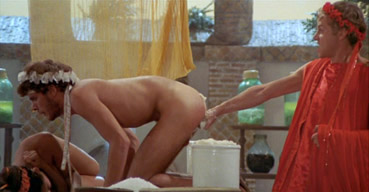
Ernest Volkman commentary (93:50)
First up this is not a commentary but a telephone interview and thus never screen specific – it plays under the first 94 minutes of the film to give you something to look at while you're listening. Volkman was the on-set reporter for Penthouse magazine during the shoot and for the first two-thirds he effectively provides the Guccione viewpoint on the whole affair, from his undisguised contempt for Brass and his vision of how the film should be to the way he describes everyone he is asked about as 'a problem'. The English actors, he assures us, were only in it for the money but were the one group who remained professional throughout, although when asked specifically about Malcolm McDowell his is quick to also label him as 'a problem' and list all the ways his ego nearly brought the film to a halt. Hmmm. Only later does he switch focus to Guccione's weaknesses. It's still an interesting contribution that provides both new information and a different angle on what you've already heard, even if you are left with the impression that, Guccione aside, the only person on the Caligula set that Ernest Volkman had any real time for was Ernest Volkman.
Theatrical Cut
Theatrical Trailer (1:45)
A visually sanitised sell that plays on the name cast and the controversy and promises plenty if you cough up the entrance fee. Not in too bad a shape, despite some dirt.
Teaser Trailer (1:07)
Bob Guccione provides the voice-over promises for this pre-release trailer, which also avoids getting visually rude.
North American R-Rated Trailer (1:00)
An alternate version of the Theatrical Trailer above.
North American Bonus Footage (31:34)
Essentially more deleted and extended scenes, this time without the porno padding and with the original soundtrack largely intact, despite the wobbly state of some of the clips. Far more interesting than the deleted and alternate scenes detailed above, many of the sequences here do add to the dramatic aspect of the film. One in particular, in which Caligula all but admits to Caesonia that his self-proclaimed divinity is a sham, complete changes your reading of the character and some of his subsequent actions.
Behind the Scenes (79:37)
A welter of footage, presumably shot by Giancarlo Lui, of the movie in production. Sets are shown in construction, actors in make-up, and just about everybody shooting sequences for the film. Standard behind-the-scenes stuff, but at this length, shorn of its original soundtrack and partnered with decorative tunes it proves damned heavy going. If you do get bored (and the chances are high), then it's worth skipping to the end to catch the somewhat bizarre sight of two Roman centurions heading home in an Austin Mini. The picture is anamorphic, but fuzzy on detail.
Extras Disc
Making of Caligula: Documentary (61:47)
Not a retrospective documentary, but one made at the time by Giancarlo Lui, the man entrusted by Bob Guccione to shoot the porn stuff behind Tinto Brass's back. Effectively an hour-long promo for the film, narrated in the deepest of trailer voices by Bill Mitchell, it has a lot in common with modern EPK featurettes, consisting as it does of interviews with cast and crew and plenty of behind-the-scenes footage. That said, you'll be pushed to find many EPKs with this much hardcore porn in them. At this point the film was still being referred to as 'Gore Vidal's Caligula', and Vidal himself talks at some length about the film and the history it's based on, but after the halfway mark and the spat between Vidal and Brass has been dealt with and dismissed, Guccione moves into the talker's seat. He's terribly sincere about the whole thing, but does have a couple of priceless moments, remarking that art director Danilo Donati has "won at least three or four Academy Awards." Shot on what looks like 16mm, the print is clean but fuzzy on detail and some way from true colours
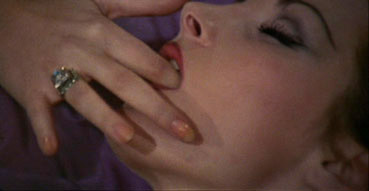
Making of Caligula: featurette (9:55)
Ah, here's the EPK, a 10 minute, cut down version of the above with a slightly less dramatic narration. And yes, some of the porn's still there.
My Roman Holiday with John Steiner (24:21)
Cult actor John Steiner looks back at his early acting work with Peter Brook and his career in Italian genre movies, which appears to have provided him with a tremendous amount of satisfaction and fun. The one exception, oddly enough, appears to have been Caligula, which he refuses to discuss in detail apart from assuring us that he hated the film and most of the people involved with it. This is a most entertaining piece nonetheless, in the main because Steiner himself is such an engaging raconteur. Stay with it through the end credits for a final anecdote involving a language mix-up and a particularly strong word.
Caligula's Pet (28:20)
Lori Wagner, who apparently was Penthouse Pet of the Century (really?), talks about her porn star role in Caligula in what on the surface looks a somewhat vacuous inclusion but, like the Volkman commentary, does provide an alternative viewpoint on aspects discussed by others. She claims to have expected a speaking part and that she was shocked by what she was asked to do on the film, whereas Volkman claims the Pets were all perfectly aware what was expected of them from the moment they were signed up. She does play the ditzy blonde just a tad, claiming that she thought Malcolm McDowell was a horrible person until a year later when a friend told her he was a great guy, but a darker side of her story is hinted at when she talks briefly about the regrets and drinking that followed her work on the film, which she apparently wanted to crawl under a rock after seeing.
Tinto Brass: The Orgy of Power (34:28)
Kicking off with the announcement that this featurette contains spoilers (thank you), this interview with Tinto Brass allows the director to present his side of the story regarding the film's conception, casting, production and troubled post-production, something he does openly and engagingly. He details the cause of the rift with Gore Vidal, the friction that developed between himself and Peter O'Toole and what happened when the film was taken out of his hands. A crucial and compelling inclusion.
Stills Galleries
This is sub-divided into 4 rolling galleries – Colour Film Stills and Black & White Film Stills are as expected running for 2 minutes 15 seconds and 3 minutes 45 seconds respectively. Behind the Scenes is further sub-divided into 16 categories, some of which run for almost 10 minutes. Promotional is a one minute flick through some posters.
DVD-ROM features
Yep, just when you think you've exhausted the extra features, stick the DVD into your computer and you'll find a bucketload of documents to breeze through, all as PDF documents. There's good stuff here, the real prizes being Gore Vidal's original 1975 script and the 1976 rewrite, the second of which retains the handwritten annotations and notes. There are biographies of Tinto Brass, Peter O'Toole, John Gielgud, Malcolm McDowell and Helen Mirren, plus shorter biographies of John Steiner, Guido Mannari (Macro), Adrianna Asti (Ennia), Paolo Bonacelli (Cassius Chaerrea), Leopoldo Trieste (Charicles), Giancarlo Badessi (Claudius) and Mirella D'Angelo (Livia). Also included are the original Caligula press notes, a brief essay on the real Caligula, Ernest Volkman's 1980 interview with Bob Guccione for Penthouse, a novelisation of the movie by William Howard, a complete scan of the May 1980 issue of Penthouse which includes a sizeable article on the film, a scan of The Penthouse Girls of Caligula, and a softcore glamour supplement entitled Lori Wagner – Caligula Revisted.
I'm torn on this. As I said above, if you hate the film then I seriously doubt anything I've said is going to persuade you to take another look. If you've never seen it then you can make a judgement on what you've read to decide whether you want to. That's where my dilemma begins. Despite the inclusion of three versions of the film, the sometimes grubby picture quality makes it hard to recommend without reservations, but the plethora of high quality extra features make the set an absolute must for the film's fans. In this respect it's as close to a definitive version as you could wish for, but then again you would expect such a version to have pristine picture and sound, which this release definitely does not. So it comes recommended, but for the content rather than the presentation. Devotees might want to wait until November when Image Entertainment release it on Blu-ray in the US*, though we're still waiting for confirmation of features and regional coding information.
* This apparently looked like crap as well.
|